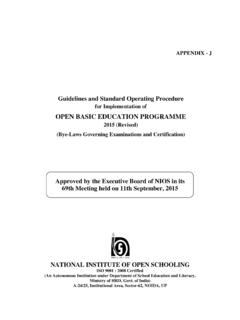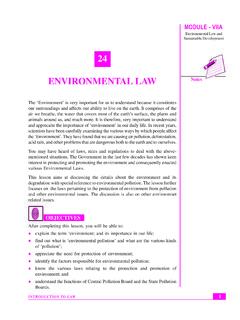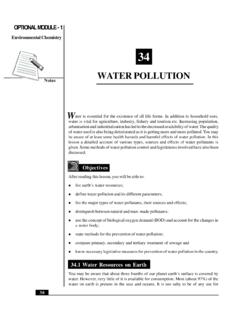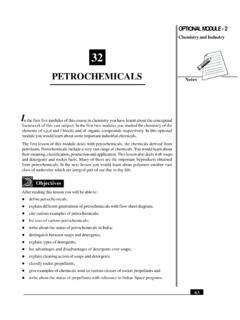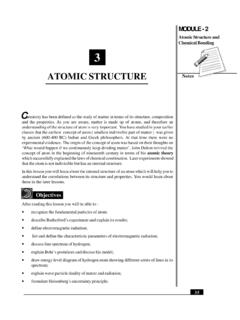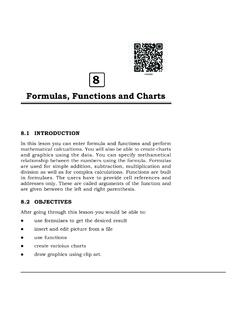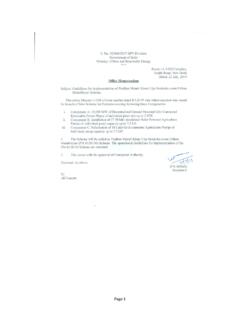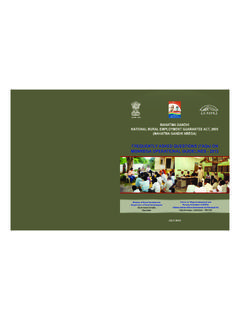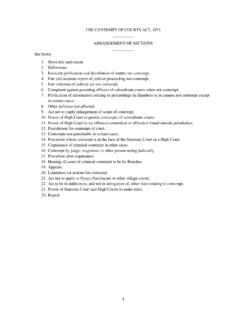Transcription of 5 NORMATIVE FUNCTIONS OF LAW AND SOCIAL CONTROL
1 MODULE - 2 FUNCTIONS andTechniques of Law 63 NORMATIVE FUNCTIONS of Law and SOCIAL ControlINTRODUCTION TO LAWN otes5 NORMATIVE FUNCTIONS OFLAW AND SOCIAL CONTROLIn this lesson you will be introduced to various kinds of norms or standardswhich help in keeping society in order. In your day-to-day life you will findvarious such examples. These norms, rules or standards maintain discipline inthe society. For example, in every game which you enjoy such as Cricket,Hockey, Football, Table-Tennis etc., there are rules which every player has toobserve. Similarly, in your family and school, there must be rules of behaviourwith elders and younger members such as, punctuality in attending classes larger level, there exist the rules of marriage, adoption and succession, rulesregarding trade and commerce etc. These rules are based on morals, religion,customs, public opinion etc. In modern time, law plays a very important rolein regulation of the various interactions amongst human beings.
2 However, themajority of laws are based on morals, customs, public-opinions etc. The lawswhich are not based on them face lot of resistance from the public and cannotbe enforced for a long studying this lesson you will be able to:zdefine Norms ;zdistinguish between Legal Norms and other Norms;zappreciate the role of Norms in the maintenance of SOCIAL order;zexplain the role of law in SOCIAL CONTROL ;zdefine Alternative Dispute Resolution (ADR);zdescribe the various forms of Alternative Dispute Resolution (ADR);zappreciate the role of Lok Adalats in resolving disputes; andzexplain the role of Supreme Court in bringing socio-economic changes TO LAWMODULE - 2 NORMATIVE FUNCTIONS of Law and SOCIAL ControlFunctions andTechniques of Law CONCEPT OR MEANING OF NORMSS ocial Norms are the beliefs of society about how members should behave ina given context. Sociologists describe Norms as informal understandings thatgovern society s simple terms, a Norm signifies a standard of behaviour to be followed bythe society.
3 These standard are considered to be necessary to maintain sourceorder. There are a number of Norms creating institutions. Some of them are:religion, ethical standard, customs and usages and ancient times, religion has played the most significant role in regulatingsociety. Religion and Law were indistinguishable. Later, some other institutionscame into existence to set Norms .All societies impose SOCIAL CONTROL on their citizens to some degree. Theymonitor and regulate behaviour formally and informally. In large-scale societies,the most visible mechanisms are laws, courts, and police. However, Law is onlyone aspect of SOCIAL CONTROL and is usually the least effective one. Small- scalesocieties maintain SOCIAL CONTROL without the complex legal institutions withwhich we are familiar. However, this does not mean that they are without to understand a society s system of SOCIAL CONTROL is understanding the socialnorms upon which it is based.
4 These are the commonly held conceptions ofappropriate and expected behaviour in a society. Norms can and do changeover time. In tradition-bound societies, Norms generally change very large, multi-ethnic societies, Norms change a society s Norms change but the laws relating to them have a long delayin catching up. The most effective form of SOCIAL CONTROL is not laws, police,and jails. Rather, it is the realisation or acceptance of the moral codes by themembers of QUESTIONS Define Norm .2. Name two Norms which regulates SOCIAL ROLE OF NORMS IN MAINTENANCE OF SOCIALORDER Norms play a crucial role in the maintenance of SOCIAL order. In every sphereof life we find some standards to regulate our behaviour. For example, thereare moral norm or standards to regulate the interactions between individualssuch as not to tell a lie, help one another in case of need etc. Similarly, thereMODULE - 2 FUNCTIONS andTechniques of Law 65 NORMATIVE FUNCTIONS of Law and SOCIAL ControlINTRODUCTION TO LAWN otesare SOCIAL Norms prevalent in various societies with regard to marriage,adoption etc.
5 Similarly, there are practices which act as Norms to be followedin particular trade or business. Law also creates Norms . In modern times, therole of Law in norm-creation is increasing day by day. However, you will noticethat the majority of Legal Norms are based on the practices or standardsfollowed in various fields in the society such as SOCIAL , moral, trade, professionand business etc. It has been seen that Legal Norms which are supported bythe above, are followed more often than the Norms which are against , sometimes law has to intervene into the in moral SOCIAL practicesprevalent in the society and pass laws to curb these practices and create newnorms. Laws to curb the evil of Dowry, Untouchability, Sati System are QUESTIONS True/False:1. Norms play a crucial role in the maintenance of SOCIAL order.(True or False)2. Law also creates Norms.(True or False)3. In modern times the role of Law in creating Norms is increasing day byday.
6 (True or False) ROLE OF LAW IN SOCIAL CONTROLS ocio-Economic Goal of the Constitution. The independence of the countryheralded a new era. The Constitution laid down the goals which the nationcommitted to achieve. The socio economic goal and the founding faiths of ourNation were incorporated in the Constitution. It enjoined the law the functionto make environmental adaptations of the existing legal system, feeling the needsand the wants of the people, evolving principles of law and legislativeformulations and statutory institutions which will harmonize with the urgenciesof our times, and translating into action the mission of the Constitution. Thus,the goals set by the Constitution made it imperative to bring about socio-economic driving force of SOCIAL change in the Indian context is the re-discovery ofthe goals of our Freedom Struggle, the realization of our national identity, thereflection on our founding faiths and fighting creeds, the strengthening of ourresolves and launching on our future with a flaming spirit, at once authentic,impatient and adventurous.
7 A militant awareness that we are free people withcommitment to SOCIAL justice still running our affairs on a legal system, self-divided and caught in a spiritual crisis, is the beginning of the mission. TheINTRODUCTION TO LAWMODULE - 2 NORMATIVE FUNCTIONS of Law and SOCIAL ControlFunctions andTechniques of Law 66 Notespolitical declaration of the independence is our incarnation to a nation; theeconomic declaration of independence is battling for self-expression, marchingfrom the Constitution towards law-in-action. Frankly, the establishment isafflicted with the pathology of split personality and loss of identity and amnesiaof our tryst with destiny. A powerful, planned comprehensive legal Protestantism,radical enough to abandon the spell of five-star prosperity and to wage war onmass poverty and SOCIAL disability is the demand on the Indian Changes and Legislative Reforms of Land Law In pursuanceof the declared objective of the Constitution, legislative process started forbringing about socio economic changes.
8 The economy of the country beingbased in most part on land and it also governed the SOCIAL structure, the landpolicy received priority. The excessive pressure on cultivable land, theconcentration of land proprietorship, the miserable economic condition of thepeasantry and their exploitation and urgent need to increase production and tomodernise methods of agriculture and channels of credit all these have hada cumulative effect on land tenure and land reform legislation. The attention ofindependent India was, therefore engaged immediately and primarily towardsoverhauling land legislation to meet the needs of the time. Consequently, allStates have enacted land reforms legislations. Legislation has been enacted forthe removal of the intermediaries between the tiller of the soil and the State,consolidation of holdings land ceiling, eradication of rural indebtedness andinstitutional sources for agricultural credit. Schemes, projects and programmesfor the improvement of agriculture horticulture and animal husbandry have beenlaunched.
9 For all-round rural uplift Village-panchayats have been established,vigorous literary drives have taken place, village and cottage industries havebeen developed and numerous other similar programmes have been worked outand given effect Labour LawThe second great concern of the Nation was to secure the welfare of the labourand industrial peace. In India, till the First World War there was almost absenceof labour legislation. It was between the 1919 and 1939, that some essentiallegislation for the protection of labour was introduced. Some legislation wasenacted after the Second World War and before the country achieved politicalindependence. This was quite inadequate in view of the new socio-economicchanges. After independence numerous labour legislations have been enactedto ameliorate the condition of the labour. The new labour laws are primarilyconcerned with the welfare of the working class and attempt to bring industrialpeace which will in its turn accelerate productive activity of the country resultingin its - 2 FUNCTIONS andTechniques of Law 67 NORMATIVE FUNCTIONS of Law and SOCIAL ControlINTRODUCTION TO LAWN otesChief Justice Gajendragadkar emphasized the necessity of adjusting the labourlaw to the new SOCIAL requirements when he wrote:Industrial Disputes Act, 1947 is the pioneer and potential legislation on thesubject.
10 The Act goes to free the parties from the shackles of their contractualstipulations and throws open the issues relating to the wages, allowances,compensation for retrenchment, closure, bonus and other fringe benefits fordeterminate afresh on broad principles of fairness and equity and in a forumdifferent from the ordinary civil court. Strikes, lockouts, closures, wages duringstrikes and lockouts and lay offs, unsettling or pre-empting disciplinary actiontaken or proposed by the employer-these and numerous matters lie within theambit of this legislation. This has been followed by a host of legislations suchas the Minimum wages Act, 1948, the Employees State Insurance Act, 1948,the Industrial Disputes (Banking and Insurance Companies) Act, 1949, theApprentices Act 1961, the Maternity Benefits Act, 1961, Labour Legislation in India has now become an important part of that socialand economic legislation which derives its inspiration from the recognition ofthe wider responsibilities which the state has undertaken to protect theeconomically weaker sections of the Family LawAnother important field where legislative activity was called for is family law was lagging much behind the SOCIAL advancement.
